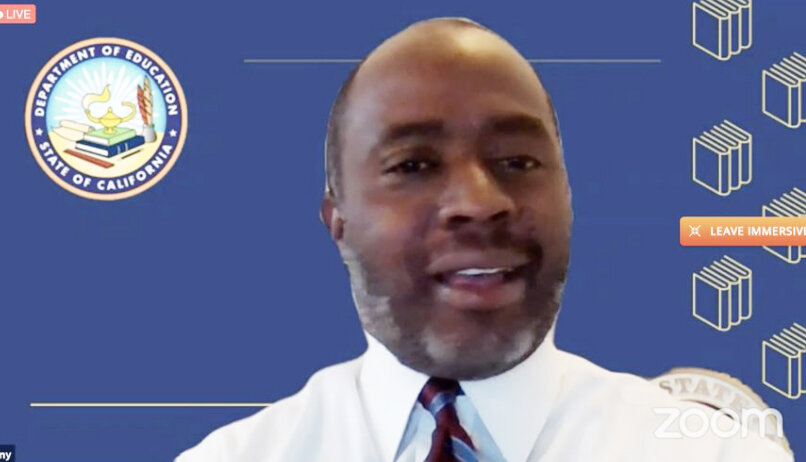Articles
Stay up-to-date with the latest developments in student health, education, and our organization's updates and events.
School-based health conference focuses on multiple threats
California State Superintendent of Public Instruction Tony Thurmond addressed nearly 1,000 registered guests at this year’s CSHA statewide School-Based Health Conference.
Nearly 1,000 student health advocates addressed the multiple pandemics facing California’s kids, teens and communities at “School Health on the Frontlines: Navigating Pandemics & Building Equity,” the California School-Based Health Alliance’s first-ever virtual School-Based Health Conference October 6-8.
Maryjane Puffer, executive director of The Los Angeles Trust for Children’s Health and board vice president of CSHA, opened the conference by stating, “School-based health centers have always been on the frontlines of healthcare by serving students and communities with the most challenges and least access to our healthcare. This year has been a real test of that system.”
She pointed to the COVID-19 pandemic, which “has brought families to the brink,” and to “the unending racial injustices faced by Black, Indigenous and People of Color.” She said, “Our youth are resilient, but they are under incredible strain.”
She noted that not one of the state’s one thousand local education entities has the recommended number of mental health professionals and only 4% of California school children have access to school–based health centers.
“The ultimate equity issue”
Dr. Tony Thurmond, California State Superintendent of Public Instruction said, “These are some of the toughest challenges we’ll see in our lifetimes.” He called “healthcare the ultimate equity issue” and said school-based health was “a top priority.”
The opening keynote speaker was Dr. Elisha Smith Arrillaga, executive director of The Education Trust–West, a research and advocacy organization focused on educational justice and supporting the high achievement of all California students. She said, “I want my son to say in the face of this epidemic that we stood by him. We must do much better, much faster. We must be co-conspirators for justice.”
The closing keynote was given by Dr. Tichianaa Armah, medical director of Behavioral Health at the Community Health Center Inc., one of Connecticut’s top school-based health center providers, and assistant clinical professor at the Yale School of Medicine. Armah outlined the impact of racism on the health and mental health of BIPOC students and communities. She shared compelling evidence of how stress of racial injustice has real health consequences, from stress and negative emotions to low-grade inflammation and chronic disease.
The CSHA Convention included three days of sessions on topics ranging from sexual and reproductive health to school mental health. The L.A. Trust’s Program Manager Robert Renteria headed a panel on “Implementing SBIRT in SBHCs” and three staff members from The L.A. Trust served as room hosts. Sixty attendees registered for the conference as guests of The L.A. Trust.
California offers financial and health aid during COVID-19 crisis
The COVID-19 outbreak has hit L.A.’s most vulnerable families, including low-income single-earner households with school-age children.
The L.A. Trust participated in a statewide interagency conference call with California Superintendent of Public Instruction Tony Thurmond and other officials outlining state services available to assist families during the COVID-19 event.
Among the highlights:
If your employer has reduced your hours or shut down operations due to COVID-19, you can file for unemployment insurance. If you are expecting to return to your job after the dust settles, you do not have to be actively seeking new work during the outbreak. But you must be “able and available to work” to get these benefits, which generally range from $40 to $450 per week for up to six months.
If you are sick or have been exposed
Individuals who are unable to work due to having or being exposed to COVID-19 (certified by a medical professional) can file a Disability Insurance claim. Disability Insurance provides short-term benefit payments to eligible workers who have full or partial loss of wages due to a non-work-related illness, injury, or pregnancy. Benefit amounts are approximately 60-70 percent of wages (depending on income) and range from $50 to $1,300 a week.
If you are caring for someone sick
Californians who are unable to work because they are caring for an ill or quarantined family member with COVID-19 (certified by a medical professional) can file a Paid Family Leave claim. Paid Family Leave provides up to six weeks of benefit payments to eligible workers who have a full or partial loss of wages because they need time off work to care for a seriously ill family member or to bond with a new child. Benefit amounts are approximately 60 to 70 percent of wages (depending on income) and range from $50-$1,300 a week.
Health resources
The Department of Health Care Services (DHCS) has published additional and updated guidance for providers, beneficiaries and the public related to COVID-19:
Fee-For-Service Prior Authorization – Section 1135 Waiver Flexibilities
Fee-For-Service Pharmacy – Section 1135 Waiver Flexibilities
Provision of Care in Alternative Settings, Hospital Capacity, and Blanket 1135 Waiver Flexibilities
FFS and Managed Care Telehealth and Virtual Communication Guidance
APL 20-004 Emergency Guidance for Medi-Cal Managed Care Health Plans
Guidance Relating to Non-Urgent, Non-Essential or Elective Procedures
Guidance for Family PACT Providers, including Telephonic Client Enrollment and Re-certification
Additional updates will be posted to the DHCS COVID-19 resource page.
This story was updated March 28, 2020 at 10:44 am.


